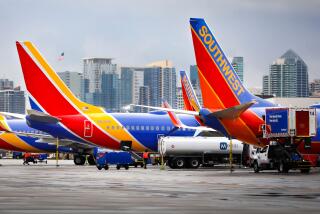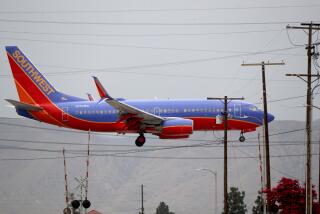Southwest Ekes Out a Profit for Fourth Quarter
Southwest Airlines, again squeezing the most from its lean operations, said Thursday that it eked out a profit in the fourth quarter when every other major U.S. airline was losing money in the aftermath of Sept. 11. Northwest Airlines and US Airways reported huge fourth-quarter losses Thursday, just as American Airlines parent AMR Corp. and Continental Airlines did a day earlier.
United Airlines parent UAL Corp. also is expected to show a big quarterly loss when it announces its results Feb. 1.
The big carriers, despite slashing their operations, have been pummeled by the drop in passenger traffic because of the terrorist attacks and the weak economy.
Southwest, which unlike the other big carriers did not cut its flights or staff, still earned $32.4million, or 4 cents a diluted share, in the fourth quarter, excluding its portion of cash aid from the federal bailout and other one-time gains and charges.
Based on the exclusions, Wall Street expected the Dallas-based carrier to break even, according to Thomson Financial/First Call. Including the special items, Southwest earned $63.5 million, or 8 cents a share, compared with $154.7 million, or 19 cents, a year earlier.
“It’s gratifying to be under such duress in our industry and turn out a profit,” said Gary Kelly, Southwest’s chief financial officer. But he said demand for air travel remains weak and fare sales aimed at stimulating traffic are “going to continue at least for the foreseeable future.”
Southwest said it earned $511.1million, or 63 cents a share, for all of 2001 (after including the government aid), which gave the Dallas-based airline its 29th straight year of profitability. It’s a string unmatched by any other carrier.
Separately, Kelly said Southwest plans to end one of its trademark practices: handing out plastic boarding cards to passengers at the gate. With new security measures creating longer lines at airports--including 100% baggage matching that begins today--Southwest plans to issue conventional paper boarding passes at ticket counters so travelers don’t have to stand in more lines than necessary, he said.
“If we can minimize the number of steps that a customer has to go through, that would be more efficient,” he said. The change should occur within six months, he said.
Northwest’s fourth-quarter loss, excluding the federal aid and other special items, was $256 million, or $3.02 a share, better than the $3.18-a-share loss expected by Wall Street.
Northwest Chairman Richard Anderson said “domestic traffic has been progressively recovering,” but earnings from those passengers is still below year-ago levels because business travel is down.
US Airways, considered one of the industry’s weakest players, said its fourth-quarter loss--excluding the government cash and one-time items--was $552 million, or $8.16 a share, worse than the per-share loss of $7.54 forecast by analysts.
When the aid and other special gains and charges were included, the Arlington, Va.-based carrier said it lost nearly $2 billion, or $29.28 a share, for all of 2001.
Another victim of the travel slump is Sabre Holdings Corp., the airline reservations giant. The company said its fourth-quarter profit, excluding special items, plunged 88% to $4 million, or 3 cents a share, from $32 million, or 25 cents, a year earlier.
Southwest’s stock rose 39 cents a share to close at $17.90 and US Airways fell 41 cents to $5.20, both on the New York Stock Exchange. Northwest shares fell 80 cents to close at $16.03 on Nasdaq.
More to Read
Inside the business of entertainment
The Wide Shot brings you news, analysis and insights on everything from streaming wars to production — and what it all means for the future.
You may occasionally receive promotional content from the Los Angeles Times.











